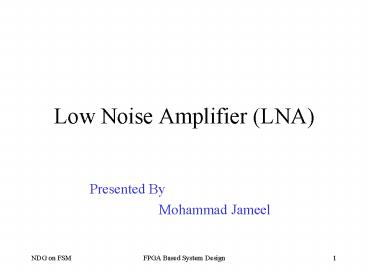Low Noise Amplifier (LNA) PowerPoint PPT Presentation
1 / 10
Title: Low Noise Amplifier (LNA)
1
Low Noise Amplifier (LNA)
- Presented By
- Mohammad Jameel
2
Mathmatical / Behavorial Model of LNA
3
Designed Mathmatical Model of LNA , Contd
Characterization of Non-Linearity (AM/AM)
- Non-linearity of LNA may be characterized by
following equation. - Let x(t) is input to a nonlinear pass band model.
Output y (t) of this system is given by - y(t) a1x(t) a2x2(t) a3x3(t) a4x4(t)
a5x4(t) - Baseband equivalent of y(t) is given as follows.
- ybb(t) (a1 a3x(t) 2 a5x(t) 4)x (t) -
- - eq. 1 - Input Signal magnitude and these three
coefficients (a3,a5 ,a1) are combined according
to the above equation to obtain the AM/AM output
as even order harmonics( a2, a4, a6 ) do not
produce Inter-Modulation (IM) products therefore
they are not taken into account in calculation. - Intermodulation is one of the major causes of
distortion in RF systems.
4
Characterization of Non-Linearity (AM/AM)
- In order to quantify intermodulation third
intercept point (IP3) has been devised. - Definition of IP3
- The point where the linear gain (a2A2) and 3rd
order non-linearity (20log(3a3A3/4) )intercept
with the increase in level of input signal (A) is
called 3rd order intercept point (IP3). It is a
given value and is used to calculate a3 and P1dB
( 1 dB compression point)
5
Characterization of Non-Linearity (AM/AM)
- AM/AM Simulink Block
- Where u magnitude of input signal
- LGAIN/ a1 input linear gain
- IP3 3rd Intercept Point
- u / Out1 modulated magnitude
of input signal
AM/AM
u
LGAIN
u / Out 1
IP3
6
Characterization of Non-Linearity (AM/AM)
- a3/ k3 Simulink Block
- Where
- LGAIN/ a1 input linear gain ( 1
- 1000 ) - IP3 3rd Intercept Point ( Range
5 100 dbm ) - a3 3rd order coefficient/ 3rd
order gain - V1 dB/ P1 dB 1 dB Gain
compression point
a3/ k3
LGAIN
a3
IP3
V1 dB/ P1 dB
7
Characterization of Non-Linearity (AM/AM)
- a3/ k3 Simulink Block
8
Characterization of Non-Linearity (AM/AM)
- a5/ k5 Simulink Block
Where a3 3rd order coefficient/
3rd order gain LGAIN/a1 input
linear gain V1 dB/ P1 dB 1 dB
Gain compression point a5 5th
order coefficient/ 5th order gain
a5/ k5
a3
LGAIN
a5
V1 dB/ P1 dB
9
Characterization of Non-Linearity (AM/AM)
- a5/ k5 Simulink Block
10
AM / AM Simulation in MATLAB
- The figures below shows the simulation result
ip3 10dbm ip3 80 dbm
11
AM / AM Simulation in Verilog
12
AM / AM Simulation in Verilog
13
Addition of Thermal Noise
- Addition of thermal noise
- AWGN noise is added to the output of AM/AM block.
This block calculates white noise for the input
signal - Pn 4kRTfs
(10NF/101) - Where NF Noise Factor 2, R System Impedance
1, K Boltzmann Constant - fs Sample rate 0, T Temperature 290 K
-
-
-
-
14
Inherent Characteristics of LFSR
15
Desired Characteristics of LFSR

